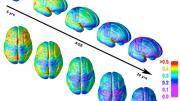As recently as 600 generations ago, our species lived as hunter-gatherers, says Daniel Lieberman, Lerner professor of biological sciences and chair of the department of human evolutionary biology. That means that from an evolutionary standpoint, the way we live now—from computers to chairs, to the simple fact of wearing shoes—is “recent and abnormal.”
“Are our abnormal lives a problem?” asked Lieberman in a talk Thursday evening at the Harvard Museum of Natural History. “In many respects, no.” Infant mortality has declined precipitously since the Paleolithic Age, and human population size has surged in the past century, largely thanks to industrialization. Meanwhile, innovations like surgery, antibiotics, and artificial limbs have had unambiguous benefits.
At the same time, Lieberman told the packed audience, “We could be doing a lot better.” In his new book, The Story of the Human Body: Evolution, Health, and Disease, to be published this Tuesday, Lieberman explores why the human body looks and functions the way it does, and the importance of knowing the story of human evolution.
As an example, he pointed to what he called an “epidemiological transition,” the shift from infectious to chronic diseases as major causes of death. Many doctors assume that the increasing burden of chronic diseases is the “price of progress” and a natural consequence of aging populations, but Lieberman argues that conditions ranging from acne and asthma to osteoporosis and type 2 diabetes may be so-called mismatch diseases, caused by bodies poorly adapted to modern environments. Such instances of what Lieberman termed dysevolution occur when old genes encounter new environments, often resulting in gradual, incremental changes that are not immediately obvious.
Lieberman offered the example of dysevolution as a result of excess. Agriculture and industrialization have revolutionized the way we produce food, he said, and for human bodies adapted to conditions of scarcity, the results can range from cavities to obesity. On the other side of the spectrum, dysevolution can also result from too little of something—for instance, exercise. Growth and maintenance of bone and muscle require consistent use, said Lieberman, whose lab studies skeletal biology (see “Head to Toe,” January-February 2011). His research has suggested that jaw size has decreased in the past few centuries as humans eat more soft, processed food. Rates of osteoporosis are on the rise, a fact Lieberman attributes to declines in the physical activity necessary to build and maintain bone mass.
Dysevolution can also result from conditions that are too new. Lieberman projected an image of a man sitting in a chair reading a book. “What could be more normal?” he asked. Yet rates of myopia are on the rise, even though the condition is rare among hunter-gatherers, and Lieberman argued that the change was too rapid to be genetic. He also pointed to high rates of flat-footedness, a trend that Lieberman, a marathon runner who has been called the “barefoot professor,” has attributed to wearing shoes.
“Our old genes can’t change. Our new environments can,” he said, and in the final portion of his talk, he made the case that combating the effects of dysevolution would require us to change the world around us. “We never evolved to make the choices we now face due to recent cultural evolution,” from junk food to sedentary lifestyles, he warned. Cultural change has outstripped natural selection, he argued, and medical research can treat only the symptoms of mismatch diseases, rather than their root causes. Moreover, he continued, education promoting healthy lifestyle choices, although a worthwhile cause, has proven insufficient to change behavior.
Instead, Lieberman advocated stricter controls on junk food in schools, along with increased requirements for exercise. For adults, he pointed to recent work in behavioral economics emphasizing the importance of “choice architecture.” “We need to respect rights, but we also need nudges,” he said. “I don’t think we should force people to do things, but we should help them.” Understanding the story of the human body, he said in conclusion, would be key to making important societal changes: “I would argue that never has evolution been more important.”
For more on Daniel Lieberman’s research from the Harvard Magazine archives, see “Skull Session” and “Dissing Evolution.”









